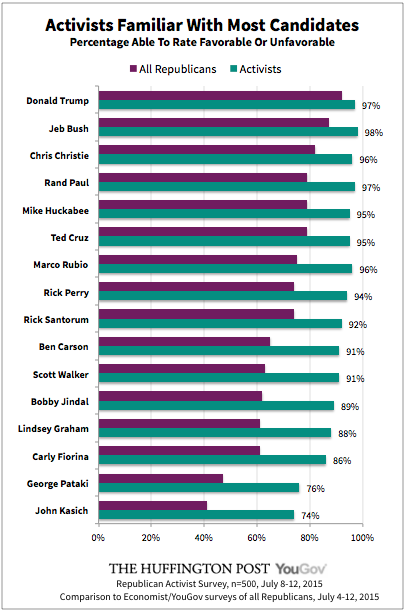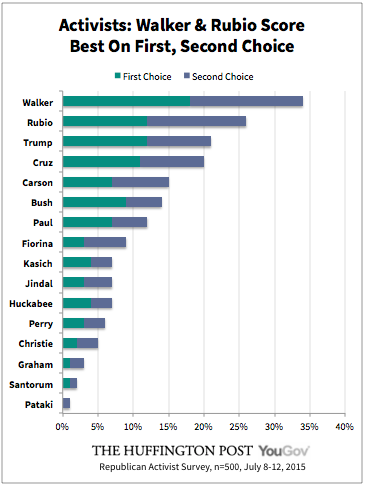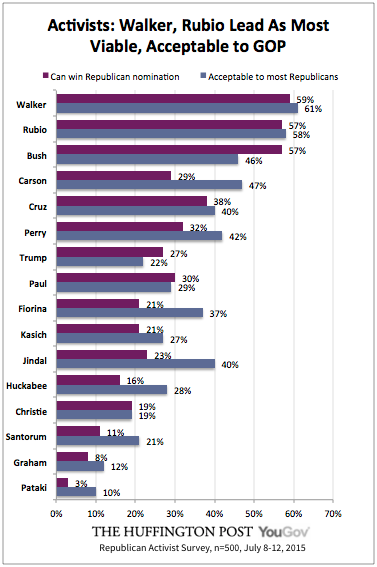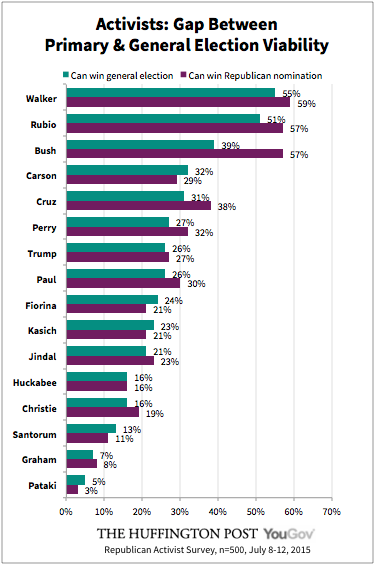We Polled True Activist Grassroots Republicans, And Here's Who They're Backing
History shows it's the views of the most plugged-in Republicans that really matter right now.
Posted: 07/23/2015 | Edited: 2 hours ago
Traditional polls provide a snapshot of what a few Americans think at any given moment. But a lot of Americans aren't even paying attention to the 2016 election yet. Do people who are paying attention see the race differently?
To answer that question, The Huffington Post worked with our survey partner YouGov to scour its Internet survey panel for activist Republicans: those who have run for or held office, served as party officials, worked on campaigns, or volunteered their time before elections. Our survey of 500 of these activists provides a look at the opinions of some of the GOP's best-informed and most politically involved supporters. (We also sampled Democratic activists and will report on those findings separately.)
These findings aren't a prediction about who will win the Republican nomination. As HuffPost's Amanda Terkel reported Wednesday, polls at similar points in previous elections suggested Rudy Giuliani, Hillary Clinton, and Dick Gephardt could end up as major-party presidential nominees. (None did.) And as HuffPollster has noted before, minor shifts in 2016 polling don't mean much.
But these new numbers illuminate how changing polling methods can produce dramatically different results. And they provide some insight into the way the campaign is taking shape among the small subset of voters who have actually started paying attention.
Unlike the broader pool of Republican adults, these activists tend to be familiar with their unruly slate of candidates. Most of them are able to rate nearly all of the candidates, with familiarity scores of 86 percent or better for all but Ohio Gov. John Kasich and former New York Gov. George Pataki. By comparison, many of the candidates remain unknown to large numbers of rank-and-file Republicans. For example, roughly 9 of 10 activists felt they knew enough to rate Wisconsin Gov. Scott Walker, Louisiana Gov. Bobby Jindal and South Carolina Sen. Lindsey Graham, candidates who went unrated by a third or more of Republican adults in recent Economist/YouGov polling.
Activists' familiarity with the candidates is not surprising given their extraordinary engagement with political news. About 87 percent say they follow what's going on in government and public affairs "most of the time," compared to just 53 percent of all Republican adults in recent HuffPost/YouGov polling.
Despite this engagement, these activist Republicans are far from reaching a consensus on a 2016 nominee. Half say they are "still making up" their minds about whom they will support, with no clear frontrunner emerging in their first choices. In this sense, the findings among activists match both the current state of endorsements by senior Republican officials and the preferences expressed on polls of Republican voters: The GOP is still very much in the early stages of deciding.
The poll does show a clear top tier of candidates currently perceived as both worthy of support and electable by the activists. By those measures, Walker and Florida Sen. Marco Rubio currently stand well above their rivals.
Walker earns a few superlatives. Alone among the candidates, he's viewed "very favorably" by more than half of the activists surveyed. Just 5 percent say they wouldn't back him under any circumstances. He's also seen as the kind of candidate who could build a strong consensus: 61 percent of activists believe Walker would be acceptable to most Republicans, and 59 percent think he's capable of winning the Republican nomination. Fifty-five percent think he's also capable of going on to win in November.
Rubio also outscores most of the Republican field on those measures, rating just below Walker. Forty-eight percent view him very favorably, and 58 percent think he'd be acceptable to most Republicans; 57 percent and 51 percent, respectively, say he could win the nomination and the general election. Only 8 percent say they'd never consider voting for him.
Walker and Rubio stand alone in their perceived viability in November, with activists holding little confidence in any of their rivals' ability to win the general election. Although former Florida Gov. Jeb Bush matches Walker and Rubio in his perceived ability to win the nomination, just 39 percent think Bush can win in November. Fewer than a third of the activists think any other candidate would be able to do so.
Bush's problems run deeper than his general election chances, with activists divided in their opinions of him. Just over half (51 percent) rate Bush favorably, but nearly as many rate him unfavorably (47 percent). A similar divide emerges on a different question about Bush winning the nomination, with exactly as many (49 percent) saying they would be either enthusiastic or satisfied as saying they would be either dissatisfied or upset (49 percent).
Not surprisingly, Bush's numbers are weaker with the most conservative activists. Activists who consider themselves part of the tea party are more likely to say they would be angry if Bush won the nomination (40 percent) than not angry (24 percent); the ire would be higher among those who say they are very conservative (41 percent) than among those who are just conservative or moderate (25 percent).
Another clue to Bush's problems with the activists is evident in the higher-than-average correlation between ratings of Bush and ratings of 2012 Republican nominee Mitt Romney -- in other words, Romney fans tend to be Bush fans. Bush's rating is stronger than average (60 percent favorable, 40 percent unfavorable) among those who rate Romney favorably. Among those who dislike Romney, Bush earns only 31 percent favorable and 68 percent unfavorable.
By some measures, Donald Trump's standing among the activists resembles his current spike among Republican identifiers in national primary polls. He is reasonably well-liked: 59 percent have a positive opinion of him.
Still, Trump attracts considerably more backlash than most other candidates, joining Bush, Graham and New Jersey Gov. Chris Christie among the candidates that more than 1 in 4 activists say they'd never vote for and that they'd be angry to see nominated. He's also widely seen as a weak candidate, with little more than a quarter saying either that he's capable of winning the GOP nomination or that he'd have a shot at the presidency -- and all this came before Trump's now well-publicized comments about Sen. John McCain.
Trump's numbers are also consistently worse among the activists we have classified as "semi-pro" -- those who say they have held or sought elective office, served as a party official or been a paid staffer for a campaign or public official -- than among those who have been only volunteers or donors. Trump's favorable rating is 20 points lower among the semi-pro activists (48 percent) than among those who have only volunteered or donated (68 percent). More than a third (38 percent) of the semi-pros say they could never support Trump compared to just 19 percent among the volunteers.
Texas Sen. Ted Cruz faces a similar split. His favorable rating is significantly higher among the volunteer activists (80 percent) than among the semi-pros (62 percent). His strongly favorable rating is highest among those who describe themselves as very conservative (57 percent) or part of the tea party (56 percent).
These findings aren't a prediction about who will win the Republican nomination, but they do provide some insight into the way the campaign is taking shape among the small subset of voters who have actually started paying attention.
The best evidence on why we should look to party activists early in the race comes from The Party Decides, a 2008 book co-authored by political scientist Hans Noel, who has studied presidential nomination campaigns, and his colleagues Marty Cohen, David Karol and John Zaller. They found that endorsements by senior "party leaders" (mostly governors, U.S. senators and members of the U.S. House) were more predictive of the ultimate outcome than polling.
Noel said that the activists HuffPost surveyed aren't quite as efficient barometers of elite opinion as endorsements are, and he cautioned there may be important differences between the two groups.
"I think there is an increasing tension between the top of the rank-and-file and the officeholders within the Republican Party," he said, with establishment officials favoring Bush and activists leaning toward candidates like Rubio and Walker. "And I think that the system may be shifting power to those top activists."
Still, Noel said, the kind of activists HuffPost surveyed may provide a relatively good proxy for the kind of decision-makers he's studied -- which is good, because endorsements at the top have been scarce so far.
"We think they might follow cues from the top," he said, "but the top isn’t giving them a lot of cues this cycle."
The HuffPost/YouGov survey consists of 500 completed interviews of self-identified Republicans selected from YouGov's opt-in online panelists who met the screening criteria for party activism. Interviews were conducted July 8-12, 2015. Full results of the survey are here, and crosstabulations are here.
The screening criteria were as follows: registered voters who think of themselves as Republicans, say they would vote in a Republican primary in their state and say they have either run for office, held elected public office, been a paid staffer for a political campaign or elected official, been a party official, or substantively contributed time or money to a campaign.
For weighting purposes, a sampling frame was created based on the American National Election Studies using similar measures of political activism. Cases were weighted to the frame using an iterative process known as raking. Weights were based on party identification, age, gender and education.
The Huffington Post has teamed up with YouGov to conduct daily opinion polls. You can learn more about this project and take part in YouGov's nationally representative opinion polling. Data from all HuffPost/YouGov polls can be found here. More details on the polls' methodology are available here.
Most surveys report a margin of error that represents some, but not all, potential survey errors. YouGov's reports include a model-based margin of error, which rests on a specific set of statistical assumptions about the selected sample, rather than the standard methodology for random probability sampling. If these assumptions are wrong, the model-based margin of error may also be inaccurate. Click here for a more detailed explanation of the model-based margin of error.







No comments:
Post a Comment
Thanks for commenting. Your comments are needed for helping to improve the discussion.